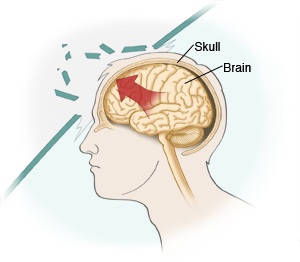A concussion is a type of brain injury. It can be caused by a direct hit or blow to the head, neck, face, or body. The force of the blow makes the head and brain shake quickly back and forth. In some cases, you may lose consciousness. Depending on the severity of the blow, it will take from a few hours up to a few days to get better. Sometimes symptoms may last a few months or longer. This is called post-concussion syndrome.
At first, you may have a headache, nausea, vomiting, or dizziness. You may also have problems concentrating or remembering things. These are common symptoms after a concussion.
Symptoms should get better as the hours and days go by. Symptoms that get worse could be a sign of a more serious brain injury. This might be a bruise or bleeding in the brain. That’s why it’s important to watch for the warning signs listed below.
School-age children are more at risk for symptoms that don’t go away after a concussion. They should be watched very closely.
Home care
If your injury is mild and there are no serious signs or symptoms, your health care provider may advise that you be watched at home. If there is evidence that the injury is more serious, you will be watched in the hospital. Follow these tips to help care for yourself at home:
-
Someone should watch you to make sure that you are able to wake up as usual and that you don't develop any concerning symptoms. After a concussion, follow your health care provider's specific instructions.
-
If your face or scalp swells, apply an ice pack for 20 minutes every 1 to 2 hours. Do this until the swelling starts to go down. To make an ice pack, put ice cubes in a plastic bag that seals at the top. Wrap the bag in a clean, thin towel or cloth. Never put ice or an ice pack directly on the skin.
-
You may use acetaminophen to control pain, unless another pain medicine was prescribed. Don't use aspirin or ibuprofen after a head injury. If you have long-lasting (chronic) liver or kidney disease, talk with your provider before using these medicines. Also talk with your provider if you ever had a stomach ulcer or gastrointestinal bleeding.
-
For the next 24 hours:
-
Don’t drink alcohol or take sedatives or medicines that make you sleepy.
-
Don’t drive or operate machinery.
-
Don't do anything strenuous. Don’t lift or strain.
-
-
Don’t return right away to sports or to any activity where you could hit your head. Wait until all symptoms are gone and you have been cleared by your health care provider. Having a second head injury before you fully recover can lead to serious brain injury.
-
After a few days, it’s okay to go back to your normal daily activities. But don’t do anything that could cause your head to be hit again.
Follow-up care
Follow up with your health care provider in 1 week, or as directed.
A radiologist will review any X-rays or CT scans that were taken. You will be told of any new findings that may affect your care.
When to get medical advice
Contact your health care provider or seek medical care right away if you have:
-
A headache or dizziness that won’t go away.
-
Redness, warmth, or pus in the swollen area.
Call 911
Call 911 or get medical care right away if you have:
-
Repeated vomiting. (It’s common to vomit once after a head injury.)
-
Headache or dizziness that is severe or gets worse.
-
Loss of consciousness.
-
Unusual drowsiness, or you're unable to wake up as usual.
-
Weakness or decreased ability to walk or move any limb.
-
Confusion, agitation, any change in behavior or speech, or memory loss.
-
Blurred vision.
-
A convulsion (seizure).
-
Swelling on the scalp or face that gets worse.
-
Changes in pupil size (the black part of the eye).
-
Fluid draining from or bleeding from the nose or ears.


